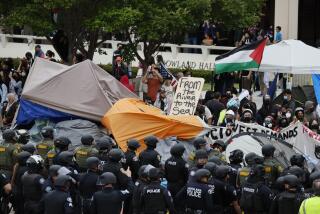Beijing Students Weigh Talks Offer : Class Boycott Continues; Support in Other Cities Reported
- Share via
BEIJING — Amid indications that pro-democracy protests here are having an impact in other cities, Chinese student leaders met Friday to consider how to respond to a conditional government offer to discuss demonstrators’ demands.
Students said they welcomed the State Council’s offer Thursday evening to open a dialogue with representatives of students who have staged almost two weeks of demonstrations. But they expressed dissatisfaction with a condition that the talks be sponsored by official Communist Party-controlled student associations. The activists were unable to reach agreement immediately on how to respond to the government’s offer.
Classes Boycotted
Students at many Beijing campuses continued a weeklong class boycott Friday. It was unclear whether the government’s offer to talk with student demonstrators about their concerns would suffice to end the boycott and head off further demonstrations.
The government made its offer after about 50,000 students, accompanied part of the time by about the same number of supporters, defied legal restrictions and thousands of police Thursday to march through the streets of Beijing in an all-day pro-democracy protest.
Major demands of the students have included press freedom, better treatment of intellectuals, and public release of figures on the income and wealth of high government and Communist Party officials.
The students also have demanded a meeting with a senior official, preferably Premier Li Peng, to discuss these issues; a public apology from Public Security Minister Wang Fang for the alleged beating of dozens of students when police broke up a demonstration on April 20, and an apology from the official New China News Agency for “misreporting” the student demonstrations.
In the coastal city of Tianjin, many students Friday were heeding a call for a nationwide class boycott to press pro-democracy demands, and students in the southern city of Changsha were trying to organize a class boycott to begin next week, according to people from those cities who spoke with reporters in Beijing.
There was also word Friday that students in Changsha had occupied the grounds of the provincial government headquarters for several hours Thursday in support of the Beijing demonstrators.
Western witnesses told reporters that several thousand students chanting, “Long live democracy! Long live freedom!” marched through Changsha on Thursday to the government compound.
They presented a list of demands, while police kept crowds of onlookers away with electric cattle prods, according to a Western witness who spoke with the Reuters news agency. The students eventually dispersed peacefully.
An earlier student demonstration last Saturday in Changsha led to rioting and looting, primarily by non-students, according to official and Western sources.
Clubbed Protesters in Xian
Rioting also broke out in the central China city of Xian after a student demonstration last Saturday.
Police in Xian, provoked by angry, stone-throwing crowds, clubbed and kicked protesters and some onlookers after the demonstration turned violent, Reuters reported from that city Friday.
Saturday’s pro-democracy demonstration in Xian began in the form of a memorial service for reformist leader Hu Yaobang, former head of the Communist Party, who died of a heart attack April 15. Hu was ousted two years ago from his top position after he was blamed for failing to control an earlier round of student protests in the winter of 1986-87.
Trouble erupted in Xian when protesters, including workers and unemployed youths, tried to storm provincial government offices, according to both official and unofficial accounts.
The New China News Agency reported that 130 police were injured but made no mention of whether protesters were injured.
Doctors at Xijing Hospital told Reuters that more than 20 people came to the hospital with injuries, and other injured persons went to other hospitals.
More to Read
Sign up for Essential California
The most important California stories and recommendations in your inbox every morning.
You may occasionally receive promotional content from the Los Angeles Times.










